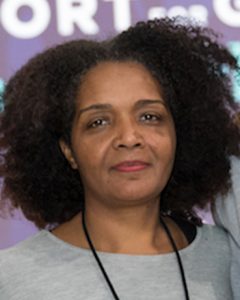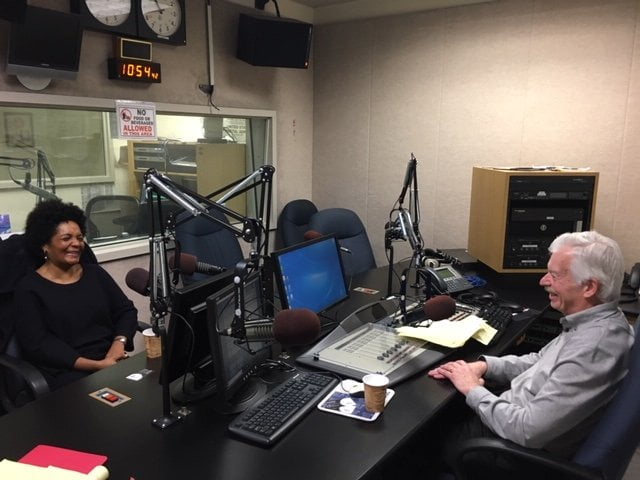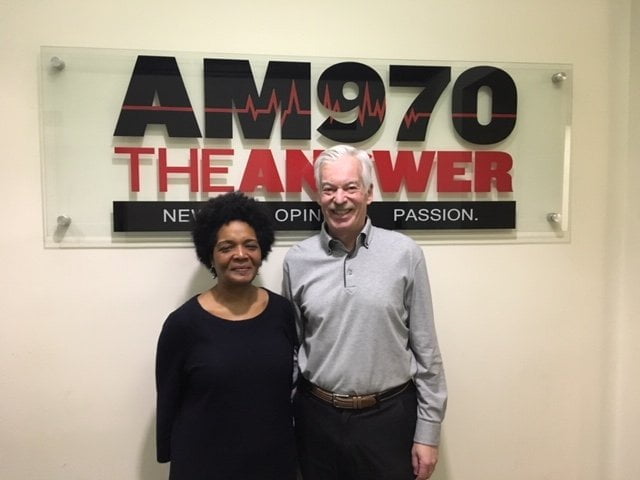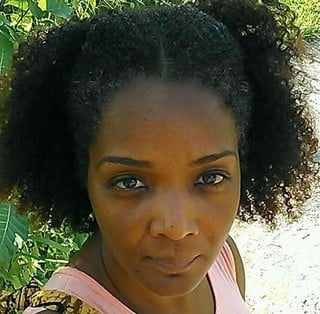The following is a conversation between Ana Reyes, Founder and Executive Director of I Challenge Myself, and Denver Frederick, Host of The Business of Giving on AM 970 The Answer WNYM in New York City.
Denver: Have you ever really challenged yourself, both physically and mentally, to achieve a feat which at first glance looks beyond impossible? My next guest saw a newspaper ad for a charity bike ride from Boston to New York – all 286 miles – and took up the challenge even though she had not been on a bike since junior high school. The end result was an organization called I Challenge Myself. And it’s a pleasure to have with us its Founder and Executive Director, Ana Reyes. Good evening, Ana, and welcome to The Business of Giving!

Ana Reyes
Ana: Hi, Denver. It’s a pleasure to be here with you.
I Challenge Myself’s mission is to use cycling and fitness to help students develop socially, academically, and physically.
Denver: Let’s begin, Ana, by having you tell us the mission and purpose of I Challenge Myself.
Ana: I Challenge Myself’s mission is to use cycling and fitness to help students develop socially, academically, and physically.
What I realized is that I was stronger than I thought I was, and that “it’s mind over matter.” And when I finished, one of the first thoughts I had was: “What if I had this experience when I was in high school, having grown up in the South Bronx, and also a first generation American, and how it would have impacted the decisions that I made about myself and what I could become?” And I really felt like somebody should start something or provide a similar experience to high school students like me.
Denver: Let me pick up a little bit on what I mentioned in the opening there, and that is you challenged yourself to take that bike ride from Boston to New York. What did you learn about yourself, and how did it fuel your energy to create this organization?
Ana: What I realized is that I was stronger than I thought I was, and that “it’s mind over matter.” And when I finished, one of the first thoughts I had was: “What if I had this experience when I was in high school, having grown up in the South Bronx, and also a first generation American, and how it would have impacted the decisions that I made about myself and what I could become?” And I really felt like somebody should start something or provide a similar experience to high school students like me.
Denver: And why not you to start it? So, when you have an idea like that, where do you start? How did you begin, Ana?
Ana: It actually took three years for me to move on it. I felt initially that I was not the right person. I was in education reform. I had been a teacher before. And, honestly, I felt like I’m not an athlete; I can’t really do this. It took three years, and it was honestly having a conversation with a friend, and I was like, “You know? I keep having this idea of starting this nonprofit and challenging students physically, but I can’t do it.” And he’s like, “Well, Ana, you can. You can hire somebody to teach the kids how to ride a bike. You’ve got other skills.” And literally, it was just that conversation. I went home, I wrote it down, and when I wrote down the concept, I realized I actually could do it. I already had a lot of the pieces together. So really, that was the first step.
Denver: Where did your first money come from? Because that’s what stops a lot of people. How do you finance an idea like this?
Ana: We were very lucky. I would say that fate had a lot to do with it. We got our funding from the Laureus Sport for Good Foundation. It’s a foundation that supports organizations like I Challenge Myself that uses sports as a tool for social change. They gave us the seed money, and they’re still one of our partners; and we lucked out.
We have students who’ve never been on a bicycle, so to basically put themselves to be that vulnerable and go on this journey says a lot about them. But at the end, what we do see is that they do tend to feel more confident about themselves, not just physically strong, but mentally stronger.
Denver: The rest is history. Well, I Challenge Myself has three signature programs, so let me ask you about each if I could. The first is Cycling Smarts. What is that all about?
Ana: Cycling Smarts introduces students to endurance bicycling as a way of helping develop self-esteem, healthy lifestyles, and also really get some out of their neighborhoods. The goal of the program is to train the students for their first Century Ride, which is 100-mile, one-day bike tour. That’s significant because a lot of our students a lot of times have only been around the block. We have students who’ve never been on a bicycle, so to basically put themselves to be that vulnerable and go on this journey says a lot about them. But at the end, what we do see is that they do tend to feel more confident about themselves, not just physically strong, but mentally stronger.
Biking also really provides a great opportunity to build camaraderie. They’re outside of the city; they’ll cross the GW Bridge, so you have to take care of one another. And so there is this feeling of being a family. And so, that’s really at the heart of that program. It’s really about confidence, team building, and then taking that experience of going from either not riding a bike or just riding around the block, and then progressively taking these small steps and getting stronger, riding longer to reach this long-term, ambitious goal. And then how do you turn that experience and transfer it to other goals that you have – graduating high school, college, and pursuing your careers.
Denver: It sounds like there is a lot around goal setting, and how to take a big idea and break it into little chunks and achieve it one step at a time.
Ana: Correct. And then surrounding yourself also with people that believe in you – your coach and your teammates.
Denver: Makes a big difference. The second, which I think is really cool, is the College Bike Tour across New York. Tell us about that.
Ana: So that’s a program that takes about 10 students from the Cycling Smarts students, 9th through 11th graders who’ve successfully completed the program. The idea is to really basically expand their options of colleges outside of New York City.
So they take the bus. They don’t ride to Syracuse, but once they’re in Syracuse, they visit seven colleges over seven days. They get to sleep in the dorms; they eat in the cafeteria; they get to meet with admissions officers. So, again, it’s just deepening, taking the biking program and then taking it to another level in terms of college access.
Denver: And your third program, which is one of the newer ones, would be 4toFIT. Now, how is that program coming along, and what that does entail?
Ana: So that program came out of what we saw when we were in high schools and were recruiting a lot of students from the physical education and gym classes… and just seeing basically these large PE classes with very little structure and not a lot of focus on skills building, not a lot of variety. And we wanted to take some of what we learned in the cycling program by giving kids a challenge that they’re working towards setting those goals.
And then, we really created this program that really teaches them the basics of fitness – how to take care of your body so that if you want to lose weight, you know how to do that… or if you want to tone, how your muscles work, how your body works, and basically so that they can take care of themselves or take care of their bodies afterward.
And we push-in. It’s a push-in program, so we provide a coach during the PE classes. Students go through four phases: control, movement, strength and power. At the end of each one, there’s a challenge that they work towards. They actually create their own routines to demonstrate what they’ve learned.
I think it’s both a combination of the people around them that were encouraging them not to quit, and then just something that’s deep within that I think happens when you do challenge yourself.
Denver: Let’s talk about those challenges for a minute because these are really not for sissies. These are pretty daunting, and I would imagine there are a lot of people along the way who want to drop out of these programs. I’m sure many of them probably do. But for those who succeed, what generally gets them through that wall that so many people will invariably hit?
Ana: That’s a great question. I remember a student coming back from—we actually did a century ride to Bear Mountain and back. And I asked him, and he said he really challenged himself. I said, “Well, what kept you going?” And the responses we get sometimes are their peers, so their teammates. And it’s just something within themselves that just won’t allow them to quit. And what we’ve learned is even some alumni—we did a survey of alumni—and one of the things that I found that resonated the most was with a number of students, what stayed with them is that: “quitting is not an option.”
So, I think it’s both a combination of the people around them that were encouraging them not to quit, and then just something that’s deep within that I think happens when you do challenge yourself – like you do make that choice of either to give up or continue. And it’s finding that giving people opportunity or kids that opportunity early on to develop that muscle, and you develop that over time; if you do it time and time and time again, it becomes easier. It does become something that you get used to doing, just overcoming those challenges.
Denver: That’s really very interesting. You think when you do it over and over again, those times you want to quit, you think back of the other times that you wanted to quit, and somehow you made it through that time, and it gives you that inspiration or that energy to say, “I thought I was going to quit then, and I made it. I’m at the same spot here. I know I can do this.” There’s a confidence that you can pull through.
Ana: Exactly. It’s kind of like you’re building this bank of confidence that you get to tap into whenever you do face a situation, and it could be physical, or it could be some other challenge really. But it’s knowing that you have that ability to persevere and to overcome. And it’s quite frankly being comfortable being uncomfortable, and part of it is getting young people to feel that and to celebrate that early on, and to say that it’s okay. It’s okay to feel comfortable in a safe space, to be uncomfortable. And what we’ve seen is that they do respond to that really well.
Denver: Well, I Challenge Myself is not a stagnant organization, and you continue to evolve. And one of the elements you’ve now included in the program are Pathways to Careers. Tell us a little bit about that.
Ana: So as an organization that right now is exclusively working with high school students- and high school students who are predominantly Latino, African-American, first generation American, first generation going to college– we really wanted to figure out: How do we go deeper? And one way that we saw was just expanding students’ perception of careers.
So we have one program that’s a mentoring program. That one really exposes students to about 40-plus paid high school internships available in New York City that include the Metropolitan Museum of Art, Apollo Theater, Central Park Conservancy, Intrepid Museum, these amazing opportunities that are only available here.

Ana Reyes and Denver Frederick inside the studio
Denver: Great organizations.
Ana: And when we realized that our students didn’t know about them, and even when we were pushing them out on social media, there is so much noise that they weren’t really paying attention. And even if they were, they may not have felt confident or really had the tools to apply for them. So that program pairs them with a mentor to really help them take advantage of those opportunities.
And then the other one is the Pathways to Health and Fitness Careers. It’s really targeting those students that are really into health and fitness and sports, and it’s giving them the opportunity both to prepare and take the group fitness certification exam. There’s the National Academy of Sports Medicine has this program, a curriculum that helps high school students take that exam. So one part is getting them ready for that. And then the other part is because they’re in our cycling, or 4toFIT, program, they actually get to apply what they’re learning as an assistant fitness or cycling coach in their class. And then what we’re looking for is really looking at feeders’ programs– whether it’s becoming a PE teacher, a group fitness trainer, and just a plethora of careers in the health and fitness field that are definitely underrepresented by people of color.
Denver: Right. So they can apprentice with you, more or less.
Ana: Correct.
Denver: You mentioned high school students. You have some partnerships with high schools. How did they come about, and who are some of your partner high schools?
Ana: Right now, we’re partnering with four high schools in the South Bronx, Washington Heights, Lower East Side and Gravesend. In the past, what we’ve done is we basically put out a request for application schools that were interested, and they applied, and there’s a process that we go through in terms of choosing the partners that we have.
Denver: Do you measure the impact and the outcomes of the students who’ve been through your program and how they’re doing?
Ana: Yes, we actually do. Fitness, obviously, is one of them, mostly now around aerobic capacity and cardio. We also measure social and emotional growth using a survey that’s helping us with that. It measures confidence. We also measure cycling skills for the cycling program, attendance, and college graduation rates for the college bike tour students.
Denver: Yes. Looking at everything. You mentioned your seed funder before, but who are some of your major financial supporters? And, Ana, what’s your pitch to them when you’re going in there looking for some bucks?
Ana: So Laureus is still a funder after all these years. We also get funding from the New York Community Trust. The Heisman Trophy Award is another grantor. We have some money from the city. And then the other funding right now that we’re getting are just donations and events.
So my pitch when I approach either foundations or—but mostly foundations for a grant is really basically to help us bring these unique opportunities to really help students embrace challenges as opportunities to learn and grow, and really to develop socially, academically and physically through biking and through fitness.
Denver: You mentioned events before. I know you have a walk coming up this spring. Tell us about that, and maybe some other events you have on the docket.
Ana: So we have a run/walk in Prospect Park on May 19, and people can sign up on our website. It’s a really family-friendly event. It’s organized by this wonderful organization called Generosity Series. We have 25 slots, so we’re looking for people to help us. It’s a crowdfunding event. And then we have indoor cycling events at Equinox, East 53rd St., and that will also be on our website shortly. So those are two events that are coming up.
Denver: I Challenge Myself is a relatively small organization. So, Ana, what are you biggest challenges on a day-to-day basis?
Ana: The biggest, I would say, we’re still a bit understaffed. I think a lot of it is operation support. So much of the funding that we get is focused on program, and so what we struggled with is building infrastructure. So communications, marketing, those types of… grants management, the things that nobody really wants to pay for because everybody wants to just focus on obviously the programs. But you can’t run a business right without having an accountant, without having communications, without having really the back-end support.
And so, I would say that that’s right now the biggest challenge. As we’ve grown our programs, the infrastructure that supports and really helps us to leverage other types of funding or tell our story better is just not there. It’s piecemeal, and it’s reflected in our marketing materials and on our website, and just other ways that’s really holding us back.
Denver: Nothing like unrestricted funding.
Ana: Yes. So, we definitely need to do a better job of that.
Denver: On a personal note, do you have a challenge right now you’re currently working on or considering?
Ana: Crazy enough, I have been intrigued lately—don’t ask me how I came across, but I’ve been thinking about…like I said I’m a first generation American, so I and my siblings will be the first to be buried on American soil. And so this idea of what happens when you’re the first, and kind of severing that tie, that familial tie.
So I’ve been curious — I have a number of relatives that…I’m Dominican… that live in–some are in Switzerland; they’re in Europe and Berlin – and just starting a project. And I just literally am at the very beginning to really look at Dominicans or Dominican women outside of the Dominican Republic and what is that experience like for them, kind of with the same frame– that question about they’re probably going to be the first, and what does that mean either to them, to their children, and just kind of exploring that idea.
So it’s one of those things that I—it is a challenge because it’s something that I’ve actually taken on; it’s something that I really want to do for myself, for my family, just part of my own personal history, and something that I feel I’ve neglected. So that’s just one kind of out-there challenge.
Denver: It sounds very similar to the process you went through with I Challenge Myself. It kind of runs around your head for a couple of years, and you think about it, and then one day, execution and action take place.
Let me close with this, Ana. We talked about the program and the kids who’ve been through it, but can you share with us a story of an individual who, having gone through this program, it’s really had an impact on their life and their future?
Ana: I’m going to just mention this person. I live in Washington Heights, like I said, and one of our programs is there, so occasionally I’ll run into some of the students. And I ran into one of our alumni on Sunday. He came up to me. I remember this particular student because he was a little bit shy, but he had this dream of becoming a police officer, like his goal was NYPD, FBI. He also had recently arrived to New York so his English was not quite up to par, but he had that. He was in our program. The program that we had at the time was really looking at a health issue affecting the community, and then they would create service-learning projects, and we really focused on elementary schools. There was one around diabetes, and the kids had to create posters on just healthy eating. So anyway, they had to facilitate; they organized the whole thing; they led the workshops.
And so when I ran into him—and we’ve stayed in touch—now, he’s an NYPD officer, and he started this program now. He’s in the Bronx where they’re working at a high school, and they’re starting, I guess, it’s a volleyball league to basically help improve relationships between the police officers and the students. And I was talking to him, I said, “Well, that sounds amazing!” And he’s like, “Well, you know that started from this experience with I Challenge Myself,” because he learned through our program the importance of giving back to the community and giving back to others.
And so that just really—it was just one of those things that I just was like “Okay, yeah. This is why…” It makes everything worthwhile… like those moments where you literally just want to give up, and like: Why am I doing this? But it was great to see that he pursued his dream regardless, and it’s taken him a little while, but he’s still there, he’s still aiming for FBI. And I think just to hear from him the impact it had on also giving back to the community was something that just was…
Denver: Nice to see him pay it forward,
Ana: Yes.
Denver: Well, Ana Reyes, the Founder and Executive Director of I Challenge Myself, I want to thank you for being here this evening. Tell us about your website, what visitors will find there, how they can get involved with your organization.
Ana: Thank you. So the website is www.ichallengemyself.org. You’ll find out about our programs. If you go to the events tab, you can find out about all our events, but also volunteer. We’re looking for volunteers to help mentor students, volunteers to help with the internship program that I mentioned to really help students prepare for that group fitness exam. Also, we need board members. We need people to volunteer to help on the cycling ride. So I would say in terms of ways people can get involved is: check out our volunteers tab, and check out the events tab. And obviously make a donation. We greatly appreciate that.
Denver: Unrestricted funding.
Ana: Unrestricted funding.
Denver: Thanks, Ana. It was great to have you on the show.
Ana: Thank you. Thanks for having me. This was a pleasure.

Ana Reyes and Denver Frederick
The Business of Giving can be heard every Sunday evening between 6:00 p.m. and 7:00 p.m. Eastern on AM 970 The Answer in New York and on iHeartRadio. You can follow us @bizofgive on Twitter, @bizofgive on Instagram and at www.facebook.com/businessofgiving.

